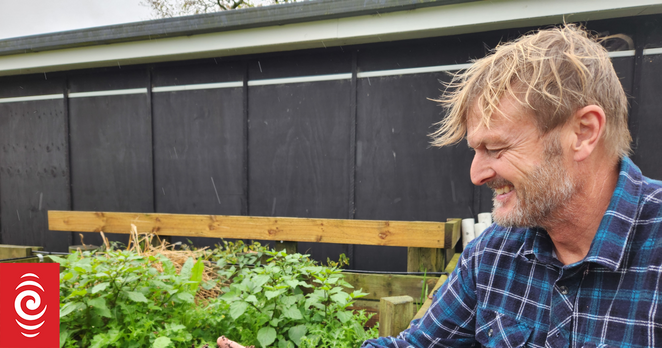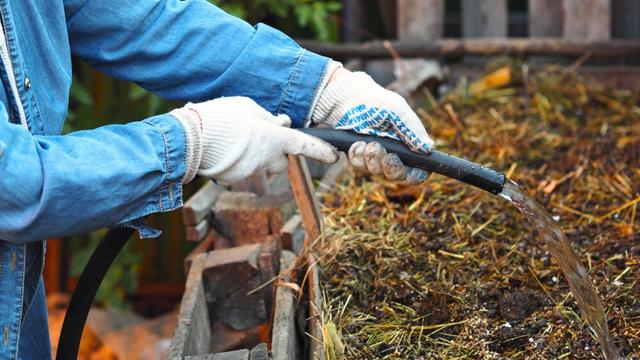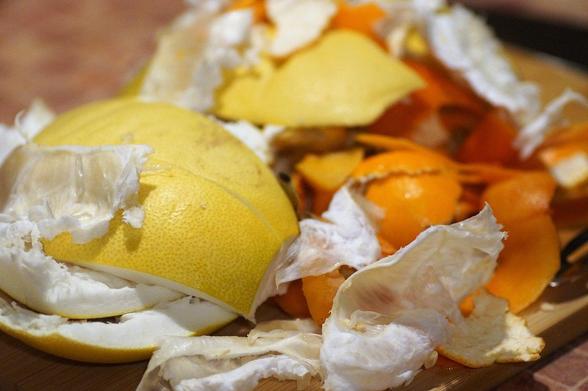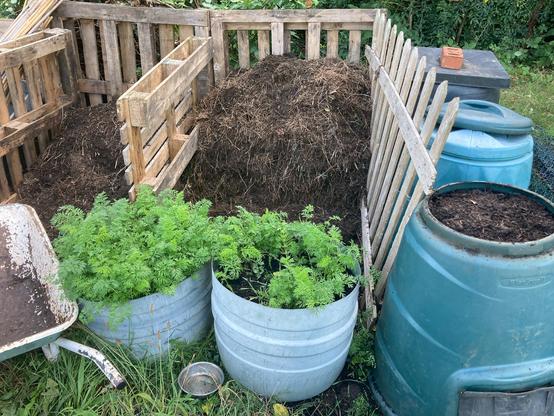The compost area on the plot. The compost in the bays will be turned into the daleks to mature. More compost from elsewhere on the plot can then be added to the bays. #Compost #Composting #Mulch #Gardening #Allotment #NoDig
Recent searches
Search options
#composting
@Tattie Bokashi bins work great here. We use them mostly to close the loop and turn any cooked food waste we have into compost.
Initially we bought some inoculated bokashi bran but now we apply a home made lactic acid bacteria spray over each layer of food waste. Works a treat. #Bokashi #Composting
Is it just me, or do Bokashi bins do fuck all?
#gardening #composting
@DoomsdaysCW Credit to you. Food security, sadly, is only going to become ever more important. Critical to that will be the ability to save seed from heirloom varieties and to distribute it for local growers.
You’ve promoted composting as a means to improve soil health. More people need to get stuck in, in the garden. These skills take time to learn and the clock is ticking.
Seed saving tips:
https://www.gardenorganic.org.uk/expert-advice/garden-management/seed-saving

I have been using the same stick for 7 years to mix my compost tea https://www.allforgardening.com/1410979/i-have-been-using-the-same-stick-for-7-years-to-mix-my-compost-tea/ #composting
#NewZealand - Country Life: Lowering costs and enriching the soil - one farmer's regenerative journey
by Sally Round, 9 August 2025
"Imagine soil like a sponge, crawling with worms, beetles dragging dung down from the surface and a riot of vegetation on top.
"It's not everyone's idea of paradise, but it's like heaven for #Kaukapakapa farmer Stephen Newman.
"Newman, a founder of the Kaipara Regenerative Farming Group and a member of farmer-led network Quorum Sense, told Country Life he used to farm very conventionally, until 'the penny dropped' a few years ago, when he watched a programme about regenerative farming.
"Since then, he has experimented with different regenerative methods on his 10-hectare block north of #Auckland city.
"Trials included sowing #CoverCrops, introducing stock for a short period of time to feed on long cover, rearing dung beetles to help transfer the nutrients in animal faeces further down the layers of soil and #composting.
"He started the #Kaipara Regenerative Farming Group about three years ago to help farmers improve soil health, enrich #biodiversity, increase water retention, and reduce reliance on fertilisers and pesticides.
" 'Everything we do with the regenerative approach is all about soil biology, creating that life in the ground.' "

Love this!!! @MaQuest
How Often Should You Wet Down Your #Compost Heap?
Compost needs more than rotting kitchen scraps to work well. It needs water, air, and a well-balanced ratio of organic matter. Wet down your compost heap as often as necessary to ensure it’s moist, aerated, and warm throughout the seasons.
by Jerad Bryant and Sarah Jay
Last updated: July 11, 2025
"Without water, compost will turn dry, brittle, and crumbly. It won’t contain tons of microbes and worms; it’ll be half of what it can be with regular watering. So, the question remains: how often should you wet down your compost heap?"

Why #Composting Is Essential During #Drought Conditions (includes tips on using #Graywater)
"Drought conditions change the fundamental dynamics of the composting process, creating unique challenges that require specific adaptations to maintain effective decomposition.
"During drought conditions, your compost pile will break down much slower than usual. The microorganisms and bacteria responsible for decomposition require moisture to function properly—with moisture levels below 40%, their activity dramatically decreases. This means kitchen scraps and yard waste that might decompose in 3-4 months could now take 6-8 months to fully break down. Without adequate moisture, fungi and bacteria simply can’t process organic materials efficiently.
"Maintaining adequate moisture becomes your biggest challenge during drought. Traditional composting guidance recommends a moisture content of 50-60%—about as damp as a wrung-out sponge. During drought, evaporation happens rapidly, with exposed compost piles losing 30-40% more moisture than normal. Your pile can quickly become too dry, entering a dormant state where beneficial microbes go inactive. This not only halts decomposition but also makes it harder to rehydrate the pile once conditions improve."
Learn more:
https://www.farmstandapp.com/19920/composting-during-drought-conditions/

#Poland - #UrbanGardens help cities fight #ClimateChange
By Andrei Ionescu
July 1, 2025
"Warsaw isn’t short on parks or tree-lined boulevards, but a trio of Polish universities wondered whether smaller, resident-run gardens could add something crucial to the capital’s climate resilience.
"To find out, researchers from SWPS University, Warsaw University of Technology, and the Warsaw University of Life Sciences mapped every vacant meadow, former orchard, and post-industrial lot within easy walking distance of apartment blocks.
"They came up with a staggering 1,864 hectares (4,600 acres) – more than enough space, they say, for a citywide network of community gardens that soak up stormwater, cool overheated streets, and capture carbon.
"The investigation combined that spatial analysis with more than 250 in-depth interviews. The goal was to see who is already gardening, what motivates them, and how much social capital – trust, shared norms, cooperative spirit – might be harvested alongside tomatoes and herbs.
Who uses the urban gardens
"It turns out the movement is surprisingly broad. Urban gardening brings together all social groups, the team reports, from school children planting pollinator patches to cultural institutions converting courtyards into micro-farms.
"Still, two cohorts dominate the regular volunteer lists: retirees – often women with higher education – and young middle class families.
"Most gardens revolve around a core group of 10 to 15 steady hands, supplemented by casual helpers and passers-by who stop to chat, water, or simply lounge among the raised beds.
Motivation of urban gardeners
"Why do they show up week after week? According to study co-author Piotr Majewski of SWPS University, the motivations of urban gardeners vary.
" 'The most important ones are: #reconnection to #nature, positive contribution to the #environment, social relations, and mutual learning between #gardeners,' said Majewski.
"Food, interestingly, is not the primary driver. Leaders said harvests help, but real value comes from #biodiversity, #composting, and public workshops on #sustainable living.
Tiny plots, big impact
"Those activities tally with an expanding body of international research linking urban agriculture to climate adaptation.
"Even pocket-size plots act as #CarbonSinks, trap particulate pollution, and soften the #UrbanHeatIsland. Raised beds can be engineered to hold back flash-flood water, while #compost heaps divert organic waste from #landfills.
"For #Warsaw, the numbers are compelling. Nearly all of the identified 1,864 hectares (4,600 acres) lie within a quarter mile of housing, meaning a potential garden is no farther than a ten-minute stroll for most residents – and often half that.
"Such proximity, the experts argue, makes it easier to harness gardens as a distributed #GreenInfrastructure network in a warming metropolis of nearly two million people.
"Yet the real strength may be social. Garden groups knit neighbors together, boosting the informal networks that cities rely on during #heatwaves, #floods, or other climate-related shocks.
"Many interviewees said they joined to cultivate community first, vegetables second. Regular workdays double as impromptu skill‐shares: retirees pass on horticultural know-how, children learn ecological stewardship, and newcomers forge local friendships.
#UrbanGardens in city plans
"Majewski and his colleagues believe Warsaw’s planners should take that social-ecological synergy seriously.
" 'The system of community gardens should also be considered as a tool to support climate change adaptation solutions in urban policies in spatial planning – provided that they are considered an important link in the urban green infrastructure system,' he explained.
"To get there, the researchers lay out a handful of recommendations. First, city hall could weave gardens into official zoning strategies rather than treating them as informal afterthoughts.
"That might mean leasing public land at peppercorn rents, streamlining permits, or integrating gardens into new housing estates from the design phase.
"Second, municipal agencies could supply starter kits – soil, timber, rain barrels – while leaving day-to-day management to residents. Third, wider publicity would help spread the idea beyond the usual eco-activist circles.
Scaling gardens citywide
"The study also flags areas for further research. At what point does a collection of isolated plots start delivering measurable cooling or flood mitigation benefits?
"How can Warsaw ensure that garden networks thrive in all districts, not just affluent ones with vocal community groups? And what responsibilities will fall on municipal departments when gardens become part of critical infrastructure rather than hobby spaces?
"Those unknowns aside, the evidence is clear: Warsaw already hosts a vibrant cohort of 'hero #activists' who coax life from overlooked corners.
"With modest institutional backing, their trowels and #CompostBins could double as #ClimateAdaptation tools – cooling concrete and absorbing rainfall.
"Perhaps most importantly, they help draw neighbors together in a city that will need every ounce of solidarity as temperatures rise."
https://www.earth.com/news/urban-gardens-help-cities-fight-climate-change/

@FaithfullJohn A compost category at the fair! This is a great thing. Thank you for sharing a photograph. We are making the planet healthy, take that fossil fuel billionaires. #composting, #compost, #gardening
I recently began experimenting with creating bone ash as a soil amendment. I plan to mix the combined bone and wood ash into my compost whenever I turn it. It’s very potent, so a little goes a long way. I just learned that I should double burn the ash to make it more soluble and readily available to the plants. Anyone else using this method? #gardening #OrganicFertilizer #composting
Yeah, I know, I know... Martha Stewart... But I've found some pretty solid #gardening ideas off her website!
5 Ways to Use #AppleCores in Your #Garden to Boost Plant Growth
Apple cores could be just the thing your garden needs to help it thrive.
By Samantha Johnson
Published on July 19, 2025
"It's easy to disregard and discard something as commonplace as the remains of an apple, but wait! Before you nonchalantly toss it in the trash, consider another use for your apple cores: in the garden. Apple cores just might be your new secret weapon in your quest to boost plant growth and raise healthy plants that thrive. We spoke to gardening experts to share the best ways to incorporate apple cores into your garden."
Woodlice play a crucial role in #composting by breaking down decaying organic matter, turning larger pieces into smaller fragments that microbes can further decompose. Their burrowing helps aerate the compost, improving oxygen flow for microbial activity, while their waste contributes valuable nutrients to the soil. In short, woodlice accelerate decomposition and enhance compost health, making them essential allies in creating rich, fertile soil.
#humus #som #sustainability #fertilesoil #compost #blacksoil
So, my neighbors have added to their flock -- but now the smell is getting a bit stronger. Since I've talked to the neighbor about how I grew up around ducks and chickens, they know I'm not squeamish about all that. But there are ways to manage one's manure pile, and I'll plan on having a friendly discussion with them. Lime is readily available at the local hardware store, and given their lack of space, probably the best solution. But any other ideas would be appreciated (enclosed composter? pine shavings?).
Help! How can I control compost smell?
https://www.backyardchickens.com/threads/help-how-can-i-control-compost-smell.468509/
They say that you can never make enough compost - they aren't kidding.
This started as about a 4x4x4 foot mass of compost, about 64 cubic feet.
I sifted maybe about 5 cubic feet from the first batch, if I'm doing my math correctly. About 3 months to get there. Off the picture is a wheel barrow full of partially decomposed stuff that went back into the middle pile.
It's great compost, but man, about 1/13th of stuff became dirt.
But I'll take it!
I didn't realize that when you order a liquid culture of mushroom spores online that they will mail you a literal syringe
My compost piles have now been inoculated with Almond mushroom (Agaricus blazei) and Wine Caps (Stropharia rugosoannulata)!
They won't fruit until the fall, but I'll check in a couple of weeks for mycellium growth to see if my dreams of Mushroom Composting are coming true
[CW non-medical syringe]
Compost maturing in the pallet bays. I find making compost a very therapeutic process. #Compost #Composting #Gardening #Allotment


